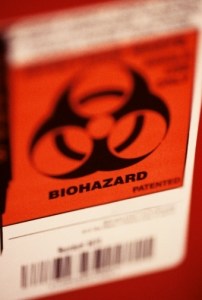Injuries from Chemical Hazards in the Workplace

At Silverman, McDonald & Friedman, our experienced workers’ compensation lawyers in Wilmington, Newark, and Seaford protect your rights to fair compensation for your workplace injury from exposure to chemical hazards on the job. If you have been hurt, we can help.
Whether you work on a construction site, at a dry cleaner, a hardware store, or a research laboratory, an accident and injury from chemical exposure can happen in many different workplace settings. Employers whose workers are exposed to potentially hazardous chemicals must follow the Occupational Safety and Health Administration or OSHA guidelines to keep their employees safe. OSHA regulates worker exposure to chemicals through education and training and through their Hazard Communication Standard (HCS), which informs workers about chemical and toxic substance exposure and appropriate protective measures.
Employers who have hazardous chemicals in the workplace must train their employees to safely handle these chemicals. Despite all of the training and education about the proper handling of hazardous materials, accidental toxic spills can put large numbers of employees in danger from exposure to harmful toxins.
If you are injured on the job from exposure to hazardous chemicals, it is vital that you report the incident to your boss immediately. Workers’ compensation benefits are available for those who experienced injuries on the job. It provides partial wage replacement for the days an injured worker is away from work recovering from their injury, as well as medical coverage.
Chemical hazards in the workplace
Chemical hazards include any type of chemical that poses a risk to health and safety. This can include common substances like cleaning products, solvents, and pesticides, as well as more dangerous materials like acids, gasses, and combustible chemicals. A chemical can become hazardous for various reasons, whether it’s toxic, corrosive, flammable, or reactive.
Exposure to chemical hazards can happen in a lot of ways:
- Inhalation – Breathing in toxic fumes or gasses
- Absorption – Coming into contact with chemicals on your skin or eyes
- Ingestion – Accidentally swallowing toxic substances
- Injection – A chemical entering the body through a cut or wound
Each type of exposure can result in different injuries, which can range from mild to life-threatening. Some workers might experience burns, respiratory issues, or even long-term conditions due to repeated exposure.
Symptoms of hazardous chemical exposure
Some of the symptoms of exposure to toxins can include:
- Chemical burns
- Itchy burning eyes
- Difficulty swallowing
- Nausea, vomiting and diarrhea
- Dizziness
- Headaches
- Fever or chills
- Rapid heart rate
Causes of chemical exposure
Chemical exposure may take place because the company used improper storage, allowed a chemical leak to occur, or mishandled toxic substances. Such errors may be due to inadequate training, negligence, and many other causes.
Diseases and environmental illnesses related to exposure to toxic substances in the workplace
A person exposed to chemical hazards in the workplace could contract illnesses and diseases such as:
- Chemical burns. Burns are one of the most common injuries caused by contact with corrosive or reactive chemicals. Chemical burns can be very painful, causing severe damage to the skin, eyes, or any area of the body they touch. In serious cases, chemical burns can lead to scarring, disfigurement, or permanent disability. Burns can also require extensive medical treatment, including surgeries and skin grafts, which can lead to high medical bills and long recovery times.
- Respiratory problems. Some chemicals, especially in gaseous or vapor form, can harm the respiratory system. Inhaling fumes from cleaning products, solvents, or other toxic chemicals can lead to respiratory distress, asthma, or even long-term damage like chronic obstructive pulmonary disease (COPD). In severe cases, exposure to certain chemicals can cause pulmonary edema (fluid in the lungs), making it hard for workers to breathe. Respiratory problems can often have a lasting impact on a person’s health, affecting their ability to work and even complete everyday activities.
- Accidental ingestion of a toxic chemical can lead to poisoning, which can cause nausea, vomiting, stomach pain, and other serious symptoms. In some cases, chemical poisoning can be fatal, especially if the worker ingests a highly toxic substance. Certain chemicals can also accumulate in the body over time, leading to chronic poisoning and long-term health problems.
- Eye and vision damage. Many chemicals are harmful if they get into the eyes. Eye exposure can happen if a chemical splashes or if a worker touches their eyes after handling chemicals. Some chemicals can cause eye irritation, redness, or swelling, while others can lead to serious damage like vision loss or blindness.
- Neurological effects. Certain chemicals can harm the nervous system, leading to neurological effects like dizziness, headaches, confusion, or even more severe symptoms like tremors or seizures. Long-term exposure to neurotoxic chemicals can also lead to conditions like memory loss, cognitive impairment, or even permanent brain damage.
- Skin irritation and rashes. Not all skin injuries from chemicals are severe burns. Some chemicals cause mild to severe skin irritation, leading to rashes, itching, or other allergic reactions. This can be uncomfortable and distracting, and in some cases, workers may even develop an allergy to certain chemicals over time.
If your injury or illness was caused by a negligent third party, such as a subcontractor, the property owner of a client worksite, or the manufacturer of defective equipment or packaging, a third-party personal injury lawsuit can provide additional compensation. A personal injury lawsuit can also include damages such as pain and suffering, future medical care, and loss of consortium, which are not available from workers’ compensation benefits.
Silverman, McDonald & Friedman is here to help when you have been injured due to chemical exposure at work. You are welcome to fill out our contact form to make an appointment for a free consultation at our offices in Wilmington, Newark or Seaford.

Attorney Jeffrey S. Friedman joined Silverman, McDonald & Friedman in 2001. He graduated from Widener University School of Law, and is admitted to practice law in Delaware and Pennsylvania, and in several Federal Circuit courts. He areas of concentration include auto accident and workers’ compensation cases. Read more about Attorney Friedman here.

